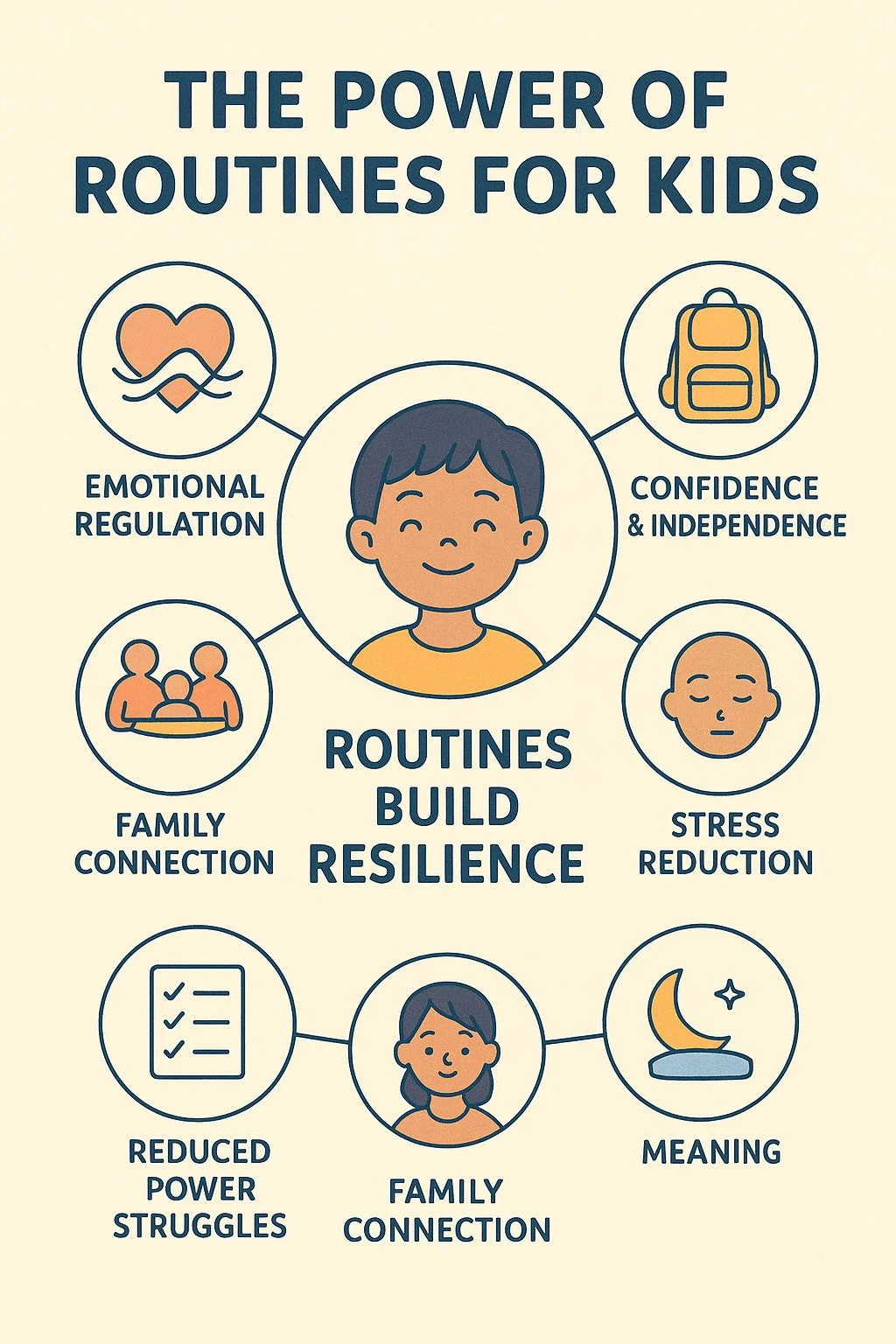The Power of Routines for Kids
In a world full of uncertainty, routines are a lifeline for children, offering stability and fostering emotional strength. From the toddler begging to read the same book again to the teen thriving on a predictable schedule, routines shape mental health and resilience. As clinicians, we once viewed routines as simple structure. Now, we see their deeper impact: helping kids regulate emotions, build confidence, and navigate life’s challenges with a sense of certainty.
Why Routines Matter for Kids’ Mental Health
Routines do more than organize a day, they build the foundation for emotional well-being. Research shows that consistent routines help children develop self-regulation skills, the cornerstone of mental health. Self-regulation allows kids to identify and manage feelings, preventing overwhelm and equipping them to handle stressors and new expectations. This skill builds over time, much like learning to read or ride a bike, with parents coaching kids through age-appropriate milestones using tools like deep breathing, hugs, or open conversations about emotions.
“Research shows that consistent routines help children develop self-regulation skills, the cornerstone of mental health.”
Routines also reduce stress and anxiety by creating predictability. For young children, knowing what to expect during separations, like bedtime or drop-offs at a babysitter’s, eases anxiety and fosters a sense of control. For teens and even adults, routines provide a calming anchor, reducing feelings of chaos and promoting emotional stability. When kids grow up in predictable environments, they learn to navigate life with confidence, setting the stage for lifelong mental health.
What Makes Routines Effective?
Routines aren’t just schedules, they’re predictable, accessible moments that invite kids to engage. Studies highlight the power of bedtime and dinnertime routines, which anchor a child’s day. These moments are accessible because kids know when and how they’ll happen, and they can participate, whether it’s setting the table or choosing a bedtime story. This predictability builds trust and stability, while also fostering independence as kids master routine steps, like getting ready for school or bed, boosting their confidence.
Rituals, routines with deeper meaning, add another layer. Think Taco Tuesdays or weekly game nights. These moments create family identity and connection, leaving an “emotional residue” that kids carry into tough times, reminding them they’re not alone. Rituals tied to family history, like recreating a grandparent’s tradition, ground kids in a sense of legacy, further supporting their mental health.
Routines also reduce power struggles. When kids know what’s expected, such as, doing homework after school, they’re less likely to resist, easing parent-child conflicts and building a sense of responsibility.
Adapting Routines in Uncertain Times
When schools close or schedules shift, routines remain essential for mental health. Here’s how families can adapt:
Routines and Rules: Kids thrive on predictability. Strict schedules can feel rigid, so try a morning meeting to set daily priorities and loose timeframes. Anchor the day with one distraction-free meal where everyone gathers. Create clear steps for daily tasks, like morning or bedtime routines, and use visuals, like picture charts for younger kids or lists for teens, to help them take ownership. Hold firm on key rules, like kindness and safety, while loosening less critical ones, like screen time, to ease stress. Encourage older kids to have a say in their schedules to help build independence.
Relationships: Kids need predictable parents, not perfect ones. Offer focused moments of attention rather than distracted all-day presence. Model healthy coping by sharing your feelings and how you manage them, showing kids it’s okay to feel big emotions. This transparency supports their emotional regulation.
Rituals: Lean into existing rituals or create new ones, like daily check-ins or weekly movie nights. Make them consistent, inclusive, and joyful to strengthen family bonds and buffer stress. Reviving a childhood tradition from your past can deepen connections, linking kids to their roots. If routines change, discuss adjustments ahead of time to maintain predictability.
Infographic showing the power of routines for kids.
If routines feel hard to maintain, family therapy at Next Chapter Counseling can help. A therapist can guide your family in creating structures that reduce stress, foster independence, and rebuild connection.
Overcoming the Chaos of Uncertainty
Without routines, kids can feel adrift, heightening anxiety and disconnection. The absence of predictable moments such as shared meals, bedtime stories, or family rituals, can erode confidence and increase stress. As Elizabeth McConnell puts it: “When life feels like a storm, routines are the lighthouse guiding kids to safety. They’re not just habits, they’re the roots that help children grow strong and steady.”
“When life feels like a storm, routines are the lighthouse guiding kids to safety. They’re not just habits, they’re the roots that help children grow strong and steady.”
Therapy can help families harness routines to support mental health. By building predictable, meaningful habits, you can reduce power struggles, foster resilience, and help kids feel secure, even in uncertain times.
A Path Forward for Families
Routines aren’t about perfection, they’re about creating a rhythm that feels safe and connected.
As family therapy scholar Salvador Minuchin said, “Only the family, society’s smallest unit, can change and yet maintain enough continuity to rear children who will not be ‘strangers in a strange land,’ who will be rooted firmly enough to grow and adapt.”
By embracing routines and rituals, families can nurture those roots, no matter what challenges lie ahead.


